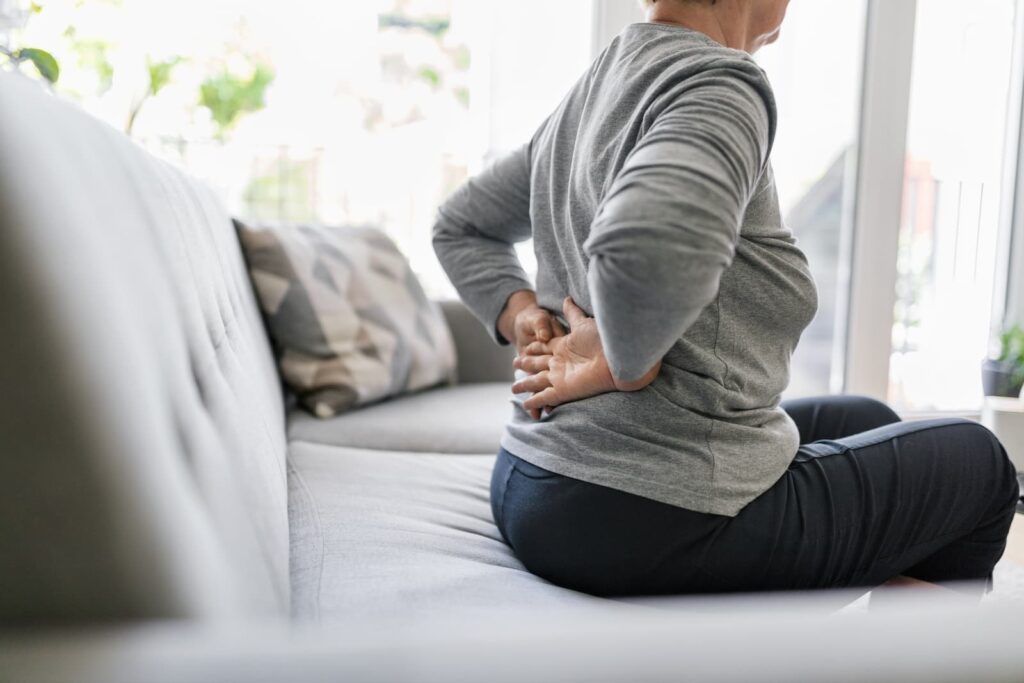
Chronic Pain Definition
Chronic pain is any pain the lasts longer than 3 months. Pain can be an unpleasant physical or emotional experience caused by actual or possible damage to our bodies.
An example of chronic pain is long-lasting knee pain. You might need to take medicines or practise daily exercises to manage the knee pain.
For some people there is an obvious ongoing cause of the pain. For others the cause of the pain has gone, or there was no obvious cause to start with. Every person’s pain is as unique as they are and should be managed individually.
What Causes Chronic Pain?
What are the common causes of chronic pain?
There are many common causes of chronic pain. These can include problems with the muscles, bones and joints, such as arthritis and back pain. Other causes include injury to nerves, cancer, or surgery.
Whether there is an underlying cause for your chronic pain or not, there are many options to improve what you can do and how you feel.
Chronic Pain Symptoms
What are the common symptoms of chronic pain?
Common symptoms of chronic pain include:
- Dull throbbing in the area of pain
- A sudden sharp pain once every so often
- Tingling or numbness in the area
- Finding it difficult to move around due to the pain
- Feeling unable to sleep well because of the pain
- The pain getting worse when you make certain movements
- Lingering pain that you need medication for to carry on with your day
 Your experience of chronic pain is unique to you. Pain can be constant, or it comes and goes. You might find there are specific triggers that can increase how much pain you feel. This sudden increase in pain is known as a flare-up.
Your experience of chronic pain is unique to you. Pain can be constant, or it comes and goes. You might find there are specific triggers that can increase how much pain you feel. This sudden increase in pain is known as a flare-up.
Some people with chronic pain have what we call neuropathic symptoms. These are unusual feelings that may be due to nerve damage. They are often described as a burning, tingling or numb feeling in the area where they get pain.
How to cope with chronic pain
Medications used for chronic pain
Medications that are used for chronic pain include those you can buy yourself without a prescription. These are called over the counter (OTC) medications which you get from a pharmacy, and include:
- Paracetamol
- Non-steroidal anti-inflammatory medicines (NSAIDs), such as aspirin, ibuprofen or naproxen
- Co-codamol, which contains codeine and paracetamol
- Codeine with ibuprofen
Some medications need to be prescribed by a doctor and include:
- Different NSAIDs, such as diclofenac
- Amitriptyline
- Pregabalin
- Gabapentin
- Opioid medicines, such as codeine, dihydrocodeine, tramadol, morphine, buprenorphine, fentanyl or oxycodone
- Lidocaine patches
- Capsaicin
- Medical cannabis, from a doctor that is a specialist prescriber
In pain clinics or hospitals, doctors might suggest an injection to areas that are causing chronic pain. These injections may contain corticosteroid medicines to reduce swelling and numb pain. They can relieve chronic pain for a long time. In some cases, pain can be relieved for a few months or years.
Chronic Pain Conditions
Common conditions that cause chronic pain
Your chronic pain might be from another source or have no obvious condition causing it.
It’s worth seeing a medical expert, such as a doctor that specialises in chronic pain, to understand your needs and help you manage your chronic pain. They can also try to determine what the cause of the chronic pain could be and offer effective ways to treat it.
Common conditions that cause chronic pain include bone, muscle and joint issues, such as:
Problems with the brain or nerves can cause chronic pain, including:
- Headaches
- Nerve damage
Pain from internal organs that can cause chronic pain include:
- Irritable Bowel Syndrome (IBS)
- Endometriosis
- Cancer
- Surgery
How is Chronic Pain Diagnosed?
Chronic pain is usually diagnosed by taking a thorough history and examination to identify the type of pain, severity, functional impact and context.
Patients with musculoskeletal pain may benefit from X-Rays of the affected joint(s).
In neuropathic pain, nerve conduction studies and electromyography are frequently used to identify which nerves are affected.
A clinician may make recommendations for other investigations depending on the underlying cause of the pain.
Chronic Pain Treatment
NICE chronic pain guidelines
NICE is the National Institute for Health Care and Excellence. The NICE chronic pain guidelines help doctors and other healthcare professionals in the UK decide how to treat chronic pain.
In the NICE chronic pain guidelines, they state that the team that treats you should:
- Focus on treating you as a whole, rather than just your condition
- Think about other possible causes of your pain
- Ask how your pain affects you
- Ask about activities that affect your pain
- Provide you with advice and information
- Develop a care and support plan, including how to manage flare-ups of pain
There are specific NICE chronic pain guidelines for conditions like:
- Endometriosis
- Headaches
- Irritable bowel syndrome (IBS)
- Low back pain and sciatica
- Neuropathic pain (nerve pain)
- Osteoarthritis
- Rheumatoid arthritis
- Spondyloarthritis
For chronic primary pain, NICE recommends these chronic pain treatments:
- Exercise and general daily physical activity
- Psychological therapy, such as acceptance and commitment therapy (ACT), or cognitive behavioural therapy (CBT)
- Acupuncture
- Medication, starting with antidepressants
Ways to relieve chronic pain
Here are some helpful ways to relieve chronic pain without medication:
- Staying active – find what you can manage to do each day, and work your way up to 30 minutes per day
- Reducing stress – this can include mindfulness meditation, thinking of ways to relax or considering seeing a professional therapist
- Social activities – these can include meeting with other people who can share how they manage their chronic pain
- Seeing a physiotherapist if the chronic pain is due to bone, muscle or joint problems
- Speaking to a doctor that specialises in chronic pain treatment
You may need to try more than one way to relieve chronic pain, and some ways will work better for you than othersWatch this documentary online to see how others deal with living with chronic pain.
Chronic Pain and Medicinal Cannabis
Research into the effect of medicinal cannabis on chronic pain is limited. However, following the legalisation of cannabis for medical purposes in 2018, there has been a rise in people looking towards medical cannabis. When first-line therapies have not proved effective at reducing symptoms, medical cannabis may be considered an option for chronic pain.
For further information and to find out more about medical cannabis, click here to discover more about our multi-award-winning Curaleaf Access Scheme. Alternatively, complete an eligibility assessment now. Once complete, one of our clinicians will review your application and advise whether you are eligible for progression to an appointment.

